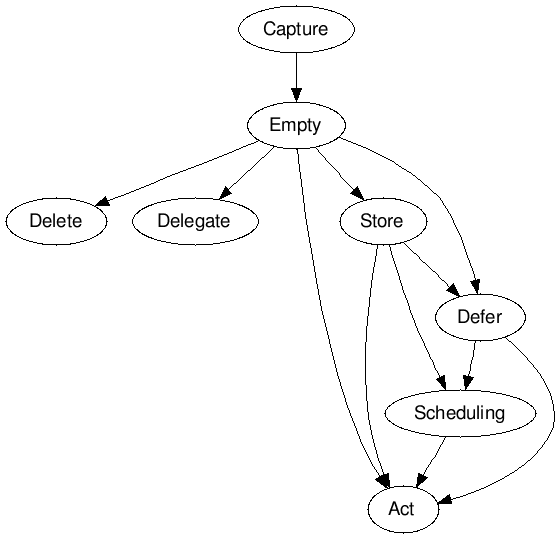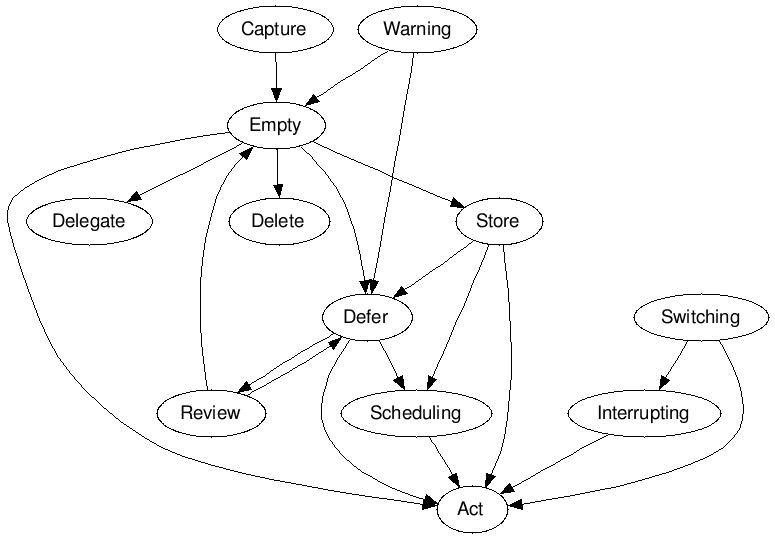Mechanics of time management

Your time and attention are finite. The demands on your time and attention are infinite. Time management is the discipline between the demands.
Making commitments that you forget and slip through the cracks? Perhaps you need to work on Capturing. Keep over booking your time? Maybe your Scheduling needs work. TODO lists 10 miles long and unmanageable? Your Review and Empty routines probably needs some help.
Everybody has a system for handling their time. The absence of a system is a system. A choice to not do anything is still a choice. Some peoples systems work better than others. Other peoples systems don't necessarily work for you. There will never be a time management system that works for everybody. Only a set of systems, tools and processes that work for you.
What you are doing right now is ok! But could it be better? Always!
In "Bill's Im-Perfect Time Management Adventure" and "Perfect Time-Based Productivity" Francis Wade introduces the ideas that instead of stressing over implementing someone else's end to end "complete perfect system" you should embrace using the tools that work for you. Break things down into disciplines and be focused on measuring and improving those individually. This fosters the idea that the tools, tips and tricks we use can all be switched in and out as appropriate.
Principles work for everybody because you are freed up to think about applying them in a way that makes sense to you. It helps to put labels on things. You can better rationalize a concept if you can give it a clear name.
Jobs / Tasks / Projects / Requests - Francis simplifies all of these into the idea that they are all just "time demands". To get anything done the common denominator to all of it is time.
Francis outlined 11 skills to master working with time demands to which I've added a 12th, delegation.
The 12 time management skills are as follows (8 Core. 4 Advanced):
- Capturing
- Emptying
- Deleting / Tossing
- Delegating
- Storing
- Scheduling
- Deferring / Listing
- Doing / Acting Now
- Switching
- Interrupting
- Warning
- Reviewing
These mechanics are complementary and linked to one another in flows. They are broad areas within which you already have a tactic to deal with it. All of these things often don't happen in pure isolation and are naturally chained together. The rules and tools you choose to chain these principles together forms your time management strategy.
Example Core Flow

Example Full Flow

It is not as complicated as it looks I promise! Your flows and connections might be different and thats ok too.
Something comes up, we work out who when where and how we are going to do it and we get it done times infinity.
So lets dig into these individual mechanics.
Capturing - Write it down all the time
This is how you make a record of new time demands.
What are the ways you take note of the things that need to be done?
Places that generate things that need to be Captured include:
- Conversations
- Meetings
- Day Dreams
- Emails
- Text Messages
- Social Media
- Instant Messages
- Phone calls
- Websites
Our email inbox automatically Captures and piles demands up for us. In meetings, notes and minutes would be a form of capturing. While you are on the phone to someone making notes would again be a form of capturing.
What are the processes and methods you use to store a time demand to be worked on in the future?
Common tools for capturing are:
- Don't - I'll remember if its important!
- Paper
- Electronic
Winning at capturing
Capturing is all about accountability. Write it down somehow.
- Keep the number of points you capture to a minimum.
- Follow this up with Emptying as quickly as practical.
- Avoid using your memory!
Emptying - Process what you have to do
This is where most of the working on work happens. All your key decisions that end up determining how and when something actually gets done (if ever) happens at this time.
How do you process this list of things that need to be done?
This is always the next logical step you take after you have Captured. You can't do everything at once so you need to sort and prioritize.
There are 2 key decisions in the emptying process
- When and with what frequency do we empty the place we've Captured
- What do we actually do with the items we've Captured!
- Delete
- Delegate
- Store
- Schedule
- Defer
- Do it right now
Winning at emptying
Like a mess that piles up the more you allow to accumulate in your capturing systems the more overwhelming the job of clearing it will feel.
- Do it all the time as quickly as possible
The following steps all come after the decisions based on Emptying.
Deleting - Get rid of stuff that doesn't need to be done
Are you geared to let stuff go or do you end up hoarding?
How vigilant are you at getting rid of things that don't need to be done?
Just because something came onto your plate doesn't mean that it ever needs to be done! It is ok to purge if you've thought through the consequences of not ever doing something.
If your system allows information to accumulate you may find this taking up precious mental space.
Delegating - Give the job to someone else
How you manage working with other people to get the job done.
Can someone else do this?
We are not always the right person for the job. When you might consider delegating:
- It is not critical that you are the one who implements the work.
- You are already over committed and the demand is important.
- The demand might grow or develop another team member.
- It is going to recur in a similar way many times in the future.
Types of delegation
When we've reached the decision to delegate we are looking to optimize both the results we directly create and those we are responsible for. How much of our own time is used in the process relates to how much responsibility for the outcome we are giving to the other person.
| Type | Description |
|---|---|
| Do exactly what I ask. | You've worked out what you want, how to do it and now you just give the job of mechanically performing the action to someone else. |
| Gather information. | You want them to research the ways forward and present them to you to make a choice about how to proceed. |
| Make recommendation. | You want them to do the research and present a recommendation to you to authorize and move forward on. |
| Make a decision. | You trust them to do the research and make the decision, you just want them to keep you in the loop along the way |
| Implement. | You trust them completed to work out how to do and implement the work and let them proceed with your full support. |
When you are Emptying and considering where demands go stop and reconsider if it should be someone else.
Storing - Record information in the most appropriate place to access it later
What do you do with information that will be useful at some other point and time?
Put information in its most appropriate place
Some information we capture might not be a task but is either research or important and just needs to be kept. So what do we do to organize and make that kind of stuff?
Winning at storing
We want to be able to put our hands on the information we've already spent time accumulating as quickly and efficiently as possible. Find appropriate homes for all the kinds of information you work with ie.
- Phone numbers get entered into your contacts app.
- Webpages might get bookmarked.
- News clippings get put into folders.
- Research or Project documents stored in a digital folder system.
Scheduling - Commit to when you are going to get it done
There is only so much you can do in a day - so planning ahead matters.
How do you plan when things need to be done in advance
What is your system for blocking out periods of time for particular demands?
There are lots of different ways you can use your calendar to block out time.
| Type | Description |
|---|---|
| Activity | Schedule any activity any time. This is a mix of meeting with people and blocking out time for things that need to be done. |
| Responsibility | Schedule activities by the hat you wear at the time. For example 7am - 8am Dad, 8am - 9am Personal, 9am - 11am Team Leadership etc |
| Location | Schedule based on your physical location during the day. People who travel frequently might designate the differences between office and transportation time. |
| Project | Splitting the work day into time for different projects to allow for dedicated focus. |
| Energy | Organize around your own person biorythms for the day. |
| Interruption | Scheduling around when interruptions should be minimized. ie for some people this may be early in the morning and late at night. |
| Appointment | Like a traditional appointment book items are for meeting with people only |
Winning at scheduling
- Keep a single calendar (or overlay multiple into once place) so you can minimize conflicts.
- Allow time either side of entries for preparation, recovery and overruns.
- Automate recurring time demands
- Remember things change and flexibility will always be required. Ensure the way plan into the future allows for easy reorganization.
Deferring / Listing - Make the decision later
How do you make a backlog of things that need to be done that you aren't doing now and haven't scheduled a time for? Your TODO list.
How do you store the things that need to be done?
One of the most common Emptying activities is placing a time demand on a list for later use. Usually we will try and list items with a common attribute together, like tasks in a project, or personal vs work. Like Scheduling there many types of ways people may organize information into lists.
Some common examples:
| Type | Description |
|---|---|
| Next Action | Things most next ready to be scheduled and done |
| Someday | Demands that could get some attention someday but there is no current urgency |
| Waiting | Demands that are blocked by something or someone else |
| Meeting | Items for discussion in the next meeting |
| Call | List of people who need to be called |
and on and on - lists of lists!
Winning at Deferring / Listing
- Keep lists to a limit. Lists that are too long will be ignored
- Regularly Review
- Regularly Delete
- Regularly Defer
Just because items made it onto your list through a round of deferring doesn't mean that they need to stay there!
Acting Now - Just Do it!

How do you get the most things done?
This is the big event - everything else is working to serve this point. Lets roll up the sleeves and get some stuff actually done!
There broadly are 2 categories of getting things done:
- Short - 5 Minutes or less.
- Long - Demands that require a form Flow.
When you are Emptying your Capture point most time management techniques recommend that if it is a task that can be done within 5 minutes or less to just do it now.
Any other demand that requires longer is usually Delegated, Scheduled or Deferred.
Onto the advanced topics:
Switching - Getting from here to there

Getting from one demand to the next is crucial to effectiveness.
How do you move from one task to the next?
"Music is the space between the notes"
Claude Debussy
The space between demands is critical to how much you get done in your day. Managing how one task is considered as complete and the methods you use to decide what is the next to move onto is one the hardest skills to master.
Finishing one demand will often trigger the generation of more demands to be Captured and dealt with like follow ups etc.
You might handle Switching through rigidly scheduling in advance. Or you may handle this by evaluating many factors of the evolving day.
Interrupting - Put that down pick this up
We have met the enemy, and he is us.
POGO
Getting carried away can be as harmful as not getting started at all.
How do you break out of flow?
When working on longer demands we hope to enter states of Flow where magic happens and lots of things get done. But if we have other demands scheduled or not that require attention how do we ensure they do not get missed or lost?
As devastating as it may feel to be interrupted when things are going well there are always other things that also need to get done.
Your system of intentional interrupting might include
- Pop up calendar reminders.
- Digital Alarm.
- Asking others to remind you.
If you find yourself over running on activities at the expense of others this may be an area you need to work on.
Warning - Danger will Robinson.

How we work on our system of working on demands!
How do you know your system is under control?
Warning is about how we send signals to ourselves that part of the system is near break down. The system could come off the rails at any point due to a variety of reasons. Often it just due to neglect or oversight. Well structured warnings give you ample to adjust and re plan.
Warning systems are numerical in nature and signal there is more or less then x.
Some examples of warnings might be:
- A threshold of items in your inbox.
- Number of activities planned for a single day.
- Time allowed between demands is too small or too great.
- Using Due Dates and Alarms.
- Scheduled Reviews.
Reviewing - What have we got and where are we at?
How do we deal with all the existing demands we accumulated?
Reviewing is the discipline of going over both the contents of the time management system and how it is working.
Reviewing Content
All of the various parts of your system that accumulates data requires review to avoid explosion. This includes your Lists, Schedules and Capture points. As part of this review process you may
- Move demands from one list to another.
- Schedule or change timings on existing demands.
- Breaking demands into smaller ones.
Reviewing System
This is the evaluation of the tools, tips and tricks you are using for all of the time management disciplines. For a lot of people reviewing the system happens reactively when it breaks. Ideally this becomes something a bit more proactive with the help of the Warning discipline above.
Putting it all together
So lets get a bit more aware of where we are at..
Time Management Evaluation
| Discipline | Score (5) | Tools / How I do it | Thoughts |
|---|---|---|---|
| Capturing | 2 | Need to work on always taking notes in meetings! | |
| Emptying | 3 | Work on actively closing email clients between windows | |
| Deleting / Tossing | 4 | Keep way too many Browser Tabs open - turn this into a better Storing skill | |
| Delegating | 4 | ||
| Storing | 2 | ||
| Scheduling | 4 | Try moving from Activity Based to Energy Based Scheduling | |
| Deferring / Listing | 4 | Experiment if using Snoozing on tasks in Google Inbox for short lived demands. | |
| Doing / Acting Now | 4 | Do it! | |
| Switching | 2 | Develop a discipline of post task review to shake out and Capture any new Demands - ie Next Actions after meetings etc | |
| Interrupting | 1 | Refine estimation in general for task length | |
| Warning | 3 | ||
| Reviewing | 3 | Develop scheduled reminders for all key reviewing tasks. |
I feel like I need to keep working on my Switching and Interruption as I get carried away. Any of the tools and methods above can be updated, changed and switched out.
Self Evaluation
So how does you system look?
| Discipline | Score | Tools / How I do it | Notes |
|---|---|---|---|
| Capturing | - | ||
| Emptying | - | ||
| Deleting / Tossing | - | ||
| Delegating | - | ||
| Storing | - | ||
| Scheduling | - | ||
| Deferring / Listing | - | ||
| Doing / Acting Now | - | ||
| Switching | - | ||
| Interrupting | - | ||
| Warning | - | ||
| Reviewing | - |
Conclusion
- Everyone has a system.
- Everyones system is different.
- Other peoples systems won't always work for you and that is ok.
- Time and attention is a finite resource.
- The Demands on your time and attention are infinite.
- There is more than one way to do something.
- Map your time management strategies to the disciplines and look to improve those.
Remember to be flexible!
“No Battle Plan Survives Contact With the Enemy”
Helmuth von Moltke





